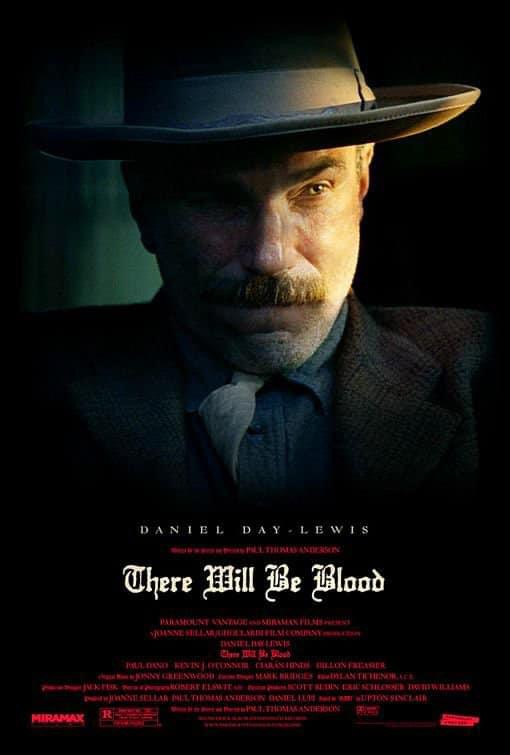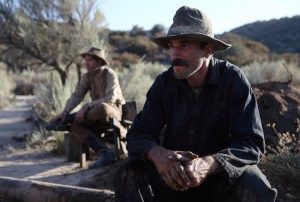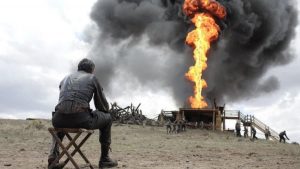There Will Be Blood (2007)

There Will Be Blood (2007), directed by Paul Thomas Anderson and adapted from Upton Sinclair’s 1927 novel Oil!, is a towering masterpiece of American cinema. Set against the backdrop of the Southern California oil boom of the late 19th and early 20th centuries, the film explores themes of ambition, greed, isolation, and the destructive pursuit of power. Its blend of stark visuals, powerhouse performances, and a haunting score make it one of the most critically acclaimed films of the 21st century, solidifying Anderson’s place among modern auteurs.
Suggested videos for you:
Plot Overview
At the heart of There Will Be Blood is Daniel Plainview (Daniel Day-Lewis), a self-made oilman whose singular ambition drives the narrative. The film opens with a nearly wordless sequence in 1898, showing Daniel working in a silver mine. He is injured, but his tenacity is clear as he extracts the precious ore. Soon after, he transitions into oil prospecting, and the film jumps to 1902, where Daniel has established himself as a successful oilman.
When Daniel receives a tip from a young man named Paul Sunday (Paul Dano) about a potential oil-rich area in Little Boston, California, he quickly seizes the opportunity. Daniel, along with his son H.W. (Dillon Freasier), goes to the Sunday family’s farm, where he pretends to be interested in buying the land for quail hunting. However, his true intentions are to exploit the oil beneath it. Daniel’s negotiations with Paul’s twin brother, Eli Sunday (also played by Dano), the local preacher, begin a battle of wills that escalates throughout the film.
As Daniel’s wealth and power grow, so does his isolation. His relationship with H.W. deteriorates after an accident renders the boy deaf. At the same time, Eli, who seeks both money and influence for his church, attempts to manipulate Daniel, believing he can bring him to heel. What follows is a tragic tale of two men consumed by their respective obsessions: Daniel with wealth and power, and Eli with religion and control.
Themes
There Will Be Blood is a meditation on the dark side of the American Dream, where ambition and success come at great personal cost. At its core, it’s a story about the corrosive nature of greed and the lengths to which men will go to achieve power, even at the expense of their humanity.
Capitalism vs. Religion is a central theme, represented through the characters of Daniel and Eli. Daniel’s worldview is rooted in pragmatism, materialism, and brute force, while Eli represents faith and spiritual authority, although his motivations are equally self-serving. Their conflict, which plays out over the course of the film, is a metaphor for the broader tension between capitalism and religion in American society, each vying for dominance.
The theme of isolation is also prevalent, particularly in Daniel’s journey. Despite his growing wealth and influence, he becomes increasingly isolated, pushing away everyone around him, including his own son. The more successful he becomes, the more paranoid and misanthropic he grows, culminating in the film’s infamous, violent conclusion.
Performances
Daniel Day-Lewis’s portrayal of Daniel Plainview is widely considered one of the greatest performances in film history. His depiction of Plainview is intense, commanding, and terrifying. Day-Lewis imbues the character with a mixture of cold calculation, charm, and untamed fury, capturing the essence of a man whose ambition consumes him. The way he modulates between charm (as he convinces townspeople to sell him their land) and explosive rage (in his confrontations with Eli) is nothing short of masterful. His performance earned him an Academy Award for Best Actor, a deserved recognition for a role that has become iconic.
Paul Dano’s dual role as Paul and Eli Sunday is also exceptional. As Eli, Dano portrays a young preacher with delusions of grandeur, a man who seeks power over his congregation and is more concerned with status than true faith. Dano plays Eli as a manipulative, at times desperate figure, whose rivalry with Daniel is both ideological and personal. The scenes where Eli attempts to exorcise Daniel’s “demons” and later where Daniel humiliates Eli are some of the film’s most memorable, largely due to the intensity of both actors.
Direction and Cinematography
Paul Thomas Anderson’s direction in There Will Be Blood is meticulous and assured. The film’s pacing is deliberate, allowing the story to unfold gradually and giving the audience time to absorb the weight of each moment. Anderson’s use of long takes and his attention to visual detail create a sense of realism and immersion, while the sparse dialogue early in the film helps to establish Daniel’s character without unnecessary exposition.
The cinematography by Robert Elswit, who won the Academy Award for Best Cinematography, is breathtaking. The film’s visuals are stark and unforgiving, much like the landscape it portrays. Elswit captures the harsh, desolate beauty of the American West, emphasizing the isolation and loneliness of the characters within it. The wide, sweeping shots of oil derricks and barren landscapes are contrasted with the intimate, claustrophobic interiors where much of the character drama plays out.
The imagery in There Will Be Blood is rich with symbolism. Oil, of course, serves as the central metaphor—representing both the promise of wealth and the corruption that comes with it. The scenes where oil gushes from the ground, covering the characters in black, sticky tar, are particularly striking, visually reinforcing the destructive consequences of Daniel’s
Music and Sound Design
Jonny Greenwood’s haunting score is one of the film’s defining elements. Best known as the guitarist for Radiohead, Greenwood’s score for There Will Be Blood is unconventional for a period piece, blending dissonant strings with minimalist compositions that heighten the tension and sense of dread. The music underscores Daniel’s descent into madness, with its repetitive, almost mechanical rhythms reflecting the relentless drive of the oil industry. The score’s unsettling, often discordant nature adds to the film’s atmosphere of unease and foreboding.
The sound design also plays a crucial role in the film. The opening sequence, where we hear only the sounds of pickaxes and machinery, sets the tone for the film’s stark, almost brutal approach to its subject matter. As the film progresses, the sound of oil drilling becomes an omnipresent force, reinforcing the sense that Daniel is engaged in a battle not only with his rivals but with the earth itself.
Reception and Legacy
Upon its release, There Will Be Blood was met with widespread critical acclaim, earning eight Academy Award nominations, including Best Picture, Best Director, and Best Actor. It has since been regarded as one of the greatest films of the 21st century. Its exploration of American capitalism, the relentless pursuit of wealth, and the human cost of ambition has resonated with audiences and critics alike, particularly in the context of modern discussions about the excesses of corporate power and inequality.
The film’s final scene, in which Daniel confronts Eli in his opulent mansion, has become iconic. The infamous “I drink your milkshake” line, delivered with venomous glee by Day-Lewis, serves as the culmination of Daniel’s descent into madness. The scene encapsulates the film’s core themes of dominance, humiliation, and the ultimate hollowness of victory.
Conclusion
There Will Be Blood is a monumental achievement in filmmaking. Its exploration of the dark side of the American Dream, paired with Daniel Day-Lewis’s towering performance, makes it a deeply affecting and thought-provoking film. Paul Thomas Anderson’s direction, Jonny Greenwood’s score, and Robert Elswit’s cinematography all contribute to a film that is as visually stunning as it is thematically rich. It’s a story of ambition, greed, and the corrupting nature of power, told with a level of craftsmanship that makes it a modern classic.










